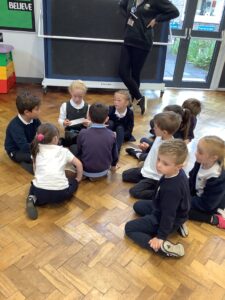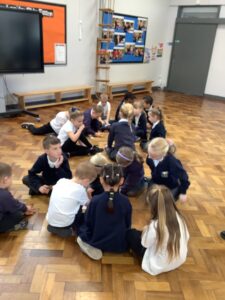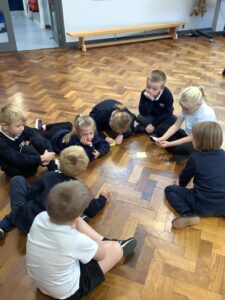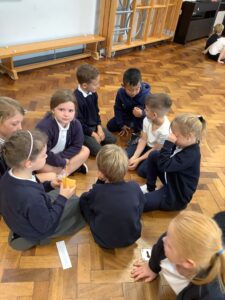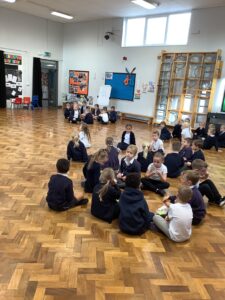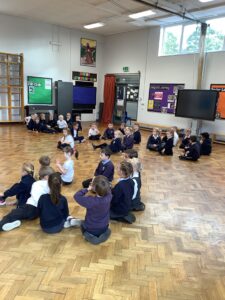14 October 2022
There’s a democracy theme to this week’s Talk Time as we think about electing our new Junior Leadership Team (JLT). It’s important for everyone to feel their opinions are important and their thoughts and feelings are listened to and valued. Democracy is about knowing that sometimes we are given the power to choose and make decisions as individuals and as a group. This leads us to this week’s Talk Time:
I can talk about what characteristics a good leader should have.
Thinking about the term democracy, take some time to think about what characteristics make a good leader and the reasons why.
Also, think about situations at home when voting can help solve problems.
Additionally, if you would like to become a member of the JLT…
Use this time to think about your own characteristics and why you feel you would be a good representative for your peers. Use these ideas to prepare a speech to share in school for the upcoming elections.
Living and Learning
This week, we’ve been thinking about how we respect ourselves in Living and Learning.
Here are some thoughtful ideas: don’t doubt yourself, accept the way you are, eat healthily, look after yourself and respect the choices that we make. We also said to do something we enjoy. Could you show respect to yourselves this weekend by doing something you enjoy as a family?
When thinking about accepting the way we are, the children were asked ‘what makes you unique and different?’ We said that being unique is being one of a kind and we are unique by the way we look, what we believe in and what we enjoy.
We drew different ‘characters’ and talked about what made them unique. Here are some of our fantastic creations:



We’re going on a bear hunt!
The children have explored the story of ‘We’re going on a bear hunt’ this week by Michael Rosen. The children have really enjoyed listening and joining in with key phrases throughout the story. They have also explored their senses and retold the story in our themed tuff-tray.
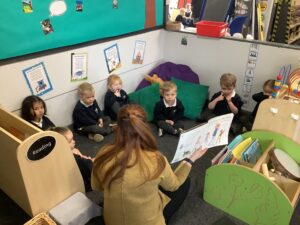
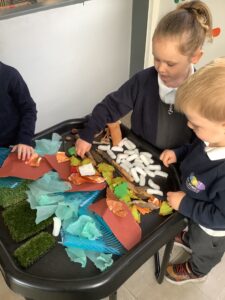
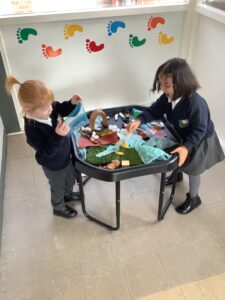
The children have continued to explore the seasonal changes in our garden area and discussed during our circle time some of the objects you might find on a walk. We also went for our ‘Wellie walk’ around our local area to see what objects we could find.
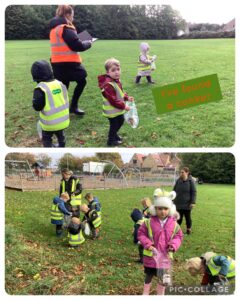
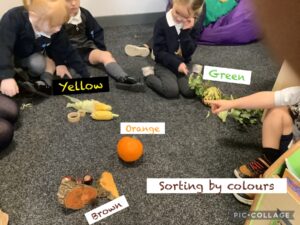
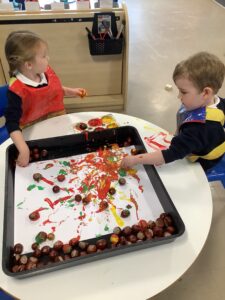
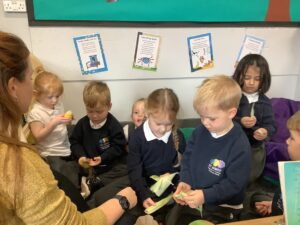
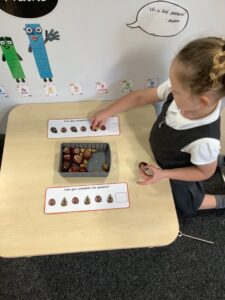
You could use some of your own conkers or leaves at home to see what patterns you can make!
The Nursery team
Numbots superstars
Well done to those children who have been using Numbots. Numbots is a fab way for the children to practise those vital maths skills that they need for their learning.
This week 29% of the class have been active on Numbots. Well done to Jig Kappaclone, Alloy Aquastar, Blue Autopod, Sunny Dataclone, Blaze Megamorph, Cruz Geigerdroid, and Crash Metastar.

It would be great if more children can be using Numbots. Have a go at using Numbots with your child for just 5 minutes a day and see how your child’s maths fluency improves.
Living and Learning: Protected Characteristics
Our Living and Learning statement last week was…
I respect others
Year 5 and 6 have been learning about equality and discrimination. We have looked at many scenarios where an individual (or group) was being discriminated against. We discussed what these reasons might be and what we would do to change the world if we could.
Then, we had a look at the Equality Act (2010) and our protected characteristics that we can’t be discriminated against. Pupils were mature, engaged and active in this learning, which resulted in some fantastic discussions and advice for others.
Here are the nine protected characteristics:
- sex
- sexual orientation
- gender reassignment
- disability
- marriage and civil partnership
- pregnancy and maternity
- religion or belief
- race
- age
We will continue to focus and test ourselves on these characteristics throughout the year.
Happy Harvest Festival!
Year 3 made me so proud at our Harvest Festival service on Thursday.
We sang some hymns and shared prayers and ideas about why it is important to make sure food is shared out fairly. The children agreed that we should only take what we need.
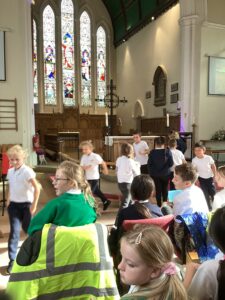
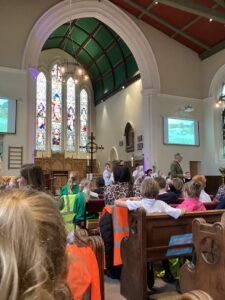
The children who read our poem did so beautifully and I was so impressed by how many children wanted to read. I wish I could have chosen everyone!
(click the link below to watch)
A big thank you to everyone who donated and those who came to support.
spellings 7th October 2022
Next week, we will practice dropping the y and adding i when we change the root word and add a suffix.
cry/ cried/ crying
carry/ carried/carrying
copy/copied/copying
worry/ worried/worrying
happen/happened/ happening
Harvest Festival
I felt so happy and proud yesterday during our Harvest Festival at church. The children read some lovely poems and prayers aloud and sang with enthusiasm. It was wonderful to see the church full of parents and carers to celebrate with us, too. Thank you to everybody who donated food which will go to St George’s Crypt in Leeds to help the homeless and vulnerable.
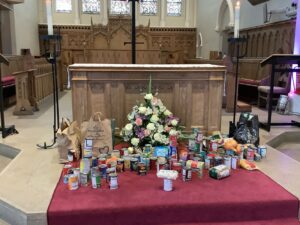
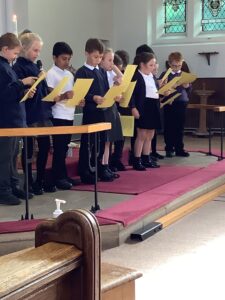
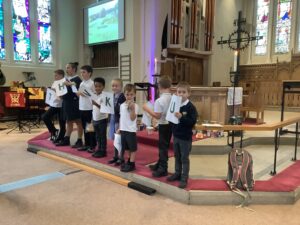
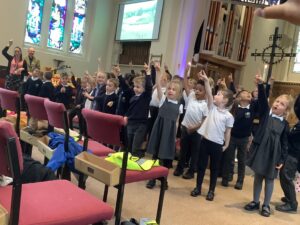
Challenges
Well done to our challenge champions this week!

Each week, we have different challenges set up in our classroom for the children to do. All the challenges are linked to our current learning.




History Topic – The Great Fire of London
This week, we have been learning about Samuel Pepys. We thought about why he was so important to the people of London during the fire. The children were all very enthusiastic and could explain their thoughts.
“He went to the king and asked him for help. The king ordered the houses to be pulled down. This helped save some of London.”
We also talked about why Samuel Pepys is important to people wanting to learn about The Great Fire of London.
“His diary helps us to know what happened!”
“His diary gave us lots of information about The Great Fire of London.”
“Told us what people had to do to get away from the fire.”
After, Year 1 and 2 worked together to read some different scenarios and they had to decide what they would do in each situation.
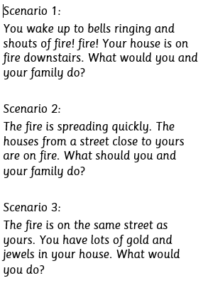

“I would get all my gold and dig a hole and bury it, then I would leave.”
“I would wake up my family up really quickly and go out of our house, hide our things and go to a new, safe place.”
“I would see if anyone needed my help to try and stop the fire.”
Challenge: Why not read a scenario to your child and see if they can tell you what they would do and why.
